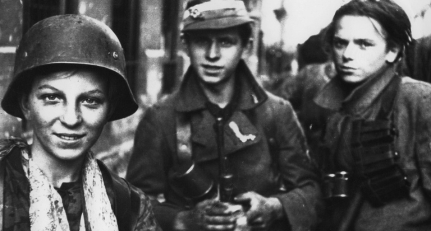My Rising ‘44

On August 1, 1944, Poland’s pro-Western underground Home Army (Armia Krajowa — AK) took to arms in the nation’s capital, Warsaw. The insurgents fought for 63 days with hardly any help from the outside.
The Western Allies including the Americans, air dropped supplies against the opposition of the Soviets, who denied them landing rights. The airplane losses were enormous, and the flights to Warsaw were suspended. The Poles were abandoned completely.
Meanwhile, Stalin’s Red Army stood by less than a mile away across River Vistula, watching for months as the Germans first slaughtered the fighters and the Polish civilian population, and then razed Warsaw to the ground.
For me, the story of the defense of Warsaw is not only a national epic from the Old Country, but also a personal one: my family fought in the Rising.
The Warsaw Rising was intended to be the culmination of the Polish endeavor to self-liberate by defeating the Germans before the arrival of the Soviets. Accordingly, in January 1944, once Stalin’s troops crossed Poland’s pre-war border, the AK command launched a rolling insurrection, code-named “Tempest” (Burza). Its centerpiece idea was to seize control of Warsaw from the Nazis, proclaim a free Polish government, and welcome the Red Army as a sovereign in full control of the capital.
But first, Polish guerrillas rose in the countryside in the east. They commenced attacking the retreating Germans, liberating small and medium size towns, and re-establishing Polish administration there. Large towns, such as Wilno and Lwów, the Poles secured jointly with the Red Army.
However, the bliss was short-lived. After joint victory parades with the Soviets, usually within two or three days, the murderous Communist secret police NKVD units surfaced, disarmed the Polish allies, shot some, and imprisoned the rest.
The prisoners were given a choice: join the Communist army under Stalin’s command, or depart for the Gulag. Most chose the latter option.
Meanwhile, the news of such outrages by a putative ally reached Warsaw and the High Command of the Home Army. From there they were conveyed to London, where the Polish Government-in-exile resided. The Poles shared the news with the Western Allies to no avail.
The émigré government hesitated but the exiled Commander in Chief forbade launching of the rising in Warsaw. Further, the underground parliament, all clandestine Polish parties from the far right to the hard left, agreed. There should be no uprising because commencing it would endanger the civilian population. The Germans would slaughter them.
An umbrella organization unifying the entire Polish political spectrum save for the Communists, the Home Army itself was split: units originating in the right-wing parties and groups definitely opposed the Rising. Their officers, like the politicians, argued that an insurrection in Warsaw was too risky. The retreating Germans ought to be attacked outside of the city.
Other commanders, in particular the followers of late Marshall Joseph Pilsudski, supported an uprising in the grand Romantic tradition. Unsurprisingly, the rank-and-file was spoiling for a fight against the Germans.
The Polish underground soldiers were all very young volunteers. They were kids. They yearned for revenge for the bestiality of four-year-long Nazi occupation. At the same time, only 10% of them had any kind of weapons. Some picked up bricks to fight Europe’s mightiest war machine.
The orders for the insurrection went out on August 1. The battle was joined. Shockingly, the fighting kids withheld the Wehrmacht, the SS, and their Slavic auxiliaries (ex-Soviet POWs who turned coat) for two long months. Every single day, for 63 days, more people died in Warsaw than on 9/11.
The enemy bombed and burned hospitals; the SS slaughtered the wounded and the medical personnel. Roaming Nazi squads executed civilians without any distinction to sex or age. Over 200,000 Polish Christian civilians perished. An infernal orgy of killing engulfed Warsaw.
My family was there. Both men and women, including my father his siblings and their parents took to the barricades. They fought. They tended to the wounded. They fed the insurgents.
They watched their city burn. Eventually they ran out of ammunition; their neighborhood fell to the Germans. Next, they witnessed unspeakable barbarities committed against defenseless civilians.
Ultimately, my family was deported to Nazi concentration camps in Germany. They survived the war. And they kept the memory of their struggle in Warsaw alive here in America. They raised me and my brother in the spirit of supreme sacrifice and service. Freedom is not free.
Ambassador Aldona Woś is currently the President of The Institute of World Politics, a graduate school of national security, intelligence, and international affairs, and she also serves on the boards of the Victims of Communism Memorial Foundation and the Council of American Ambassadors.

